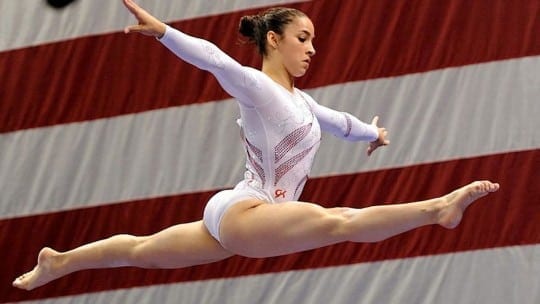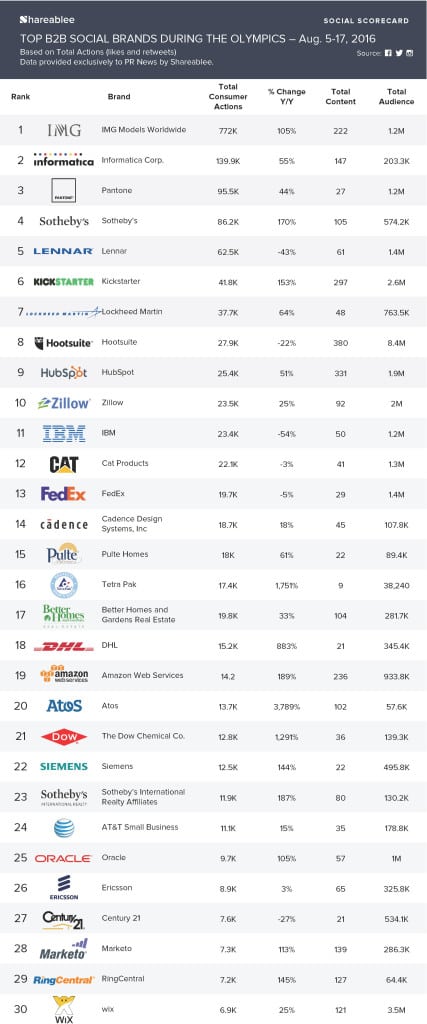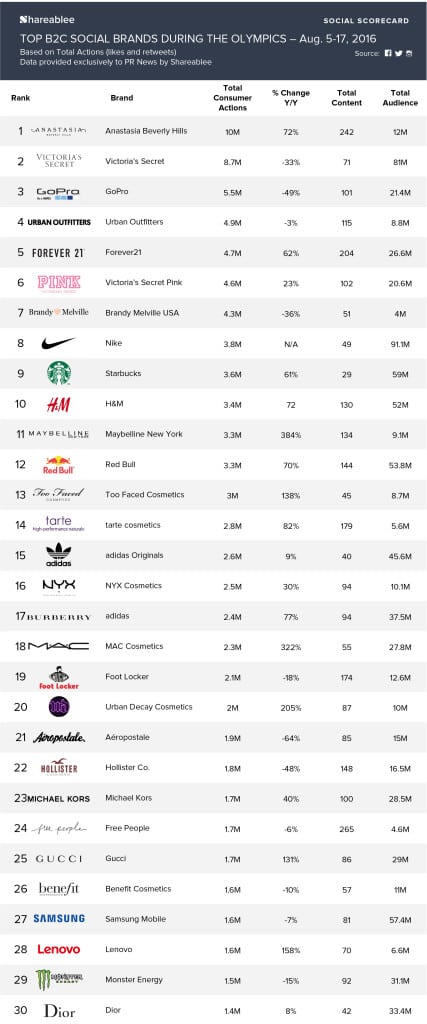
As we know, the Summer Olympics has evolved into far more than a 19-day buffet of sporting events. In the last 80 years the games have developed into a mega political conflagration every four years. More recently they’ve also become a global television extravaganza with an audience of more than 3.6 billion. That has translated into more than $4 billion in TV rights flowing to the International Olympic Committee. When the rules shifted to allow the competing athletes to include professionals, the media spotlight shone even brighter. Somewhere along the way brands got involved in the tumult, some as sponsors. Rio’s 11 global sponsors have a combined market value of more than $1.5 trillion, says Bloomberg. This infusion of money has transformed a competition between mostly obscure amateurs into very big business [see table on page 6]. Rio will be the richest Olympics by a good margin. A portion of that activity has made its way to social media.
Since the 2016 Summer Olympics in Rio de Janeiro, Brazil, began August 5, and through August 17, U.S. B2B brands have generated 1.8 million total consumer social actions on Facebook, Twitter and Instagram, according to data supplied exclusively by Shareableeto PR News Pro. That represents a significant 50% rise compared with the same time last year. Social action, or engagement, is defined as the sum of social shares, retweets and likes of brands’ posts by consumers on the various platforms. Of course, not every post from B2B or B2C brands was related to the games in Rio.
Ironically it was B2B brands that, percentagewise at least, generated the most engagement. While B2C brands generated more than twice as many total social engagements as B2B brands, 212.9 million, that is a year-over-year decline of 7%.
Interesting, too, is the distribution of engagement between platforms. For B2B brands, engagement was 56% on Instagram, 33% on Facebook and 12% on Twitter.
For B2C brands, it’s 84% on Instagram, 14% on Facebook and 1% on Twitter.
A trend we’ve seen often when looking at brands’ consumer engagement is a decline in the number of posts resulting in engagement growth. The ability to generate more engagement with fewer posts is linked to brands’ greater knowledge of social media. The other factor is video’s power.
Indeed, brands posted less often during the Olympics period compared with the same time last year—16% (B2B) and 19% (B2C), respectively. The 50% increase in engagement of B2C brands mentioned above can be attributed to an 89% rise in actions from video content.
Moving to the top 30 B2B brands during this time period, IMG Models Worldwide led the ranking with 772,000 actions, 452% more than Informatica, which came in at number two. Pantone, Sotheby’s and Lennar round out the top 5. IMG generated 95% of its engagement on Instagram. IMG’s second-most-engaged post featured IMG supermodel Gisele Bündchen, who was celebrated during the opening ceremony as a native Brazilian.
Just two of the top 30 B2B brands that experienced the most year-over-year engagement growth were Olympics global partner sponsors: Atos and The Dow Chemical Co., which grew 3,789% and 1,291%, respectively. A vast majority of Atos’ content since August 5 was related to the Olympics. Its top post touted its role in the games. Dow’s most-engaged post linked to a news release about its 60+ years working in Brazil. It generated more than 11,000 actions, 89% of its engagement since August 5.
The nine other official global partners for Rio are: Bridgestone, Coca-Cola, GE, McDonald’s, Omega, Panasonic, P&G, Samsung and Visa. Each paid an estimated $120 million for the right. It’s estimated they will pony up nearly four times that amount during the games for ads and other promotion.
Among B2C brands, Anastasia Beverly Hills led the pack with nearly 10 million total social actions, including 99% on Instagram. Victoria’s Secret, GoPro, Urban Outfittersand Forever 21 rounded out the top 5. Only Victoria’s Secret posted Olympics content, though, with regrams of models Alessandra Ambrosio and Adriana Lima, who participated in the opening ceremonies in their native Brazil.
GoPro posted content from Rio, but didn’t mention the games. It regrammed photos of its users rock climbing and kite surfing. Nike, number 8 among B2C brands, is an Olympics supplier. The athletic footwear and apparel company generated almost all of its engagement since August 5 by featuring Team USA athletes it sponsors. Some of its top posts were Instagram videos that feature stories about U.S. medal-winning gymnasts Simone Biles and Gabby Douglas. The videos, part of Nike’s Unlimited campaign, are narrated by a family member and feature footage from the athletes’ childhoods.



